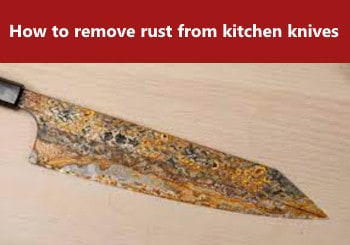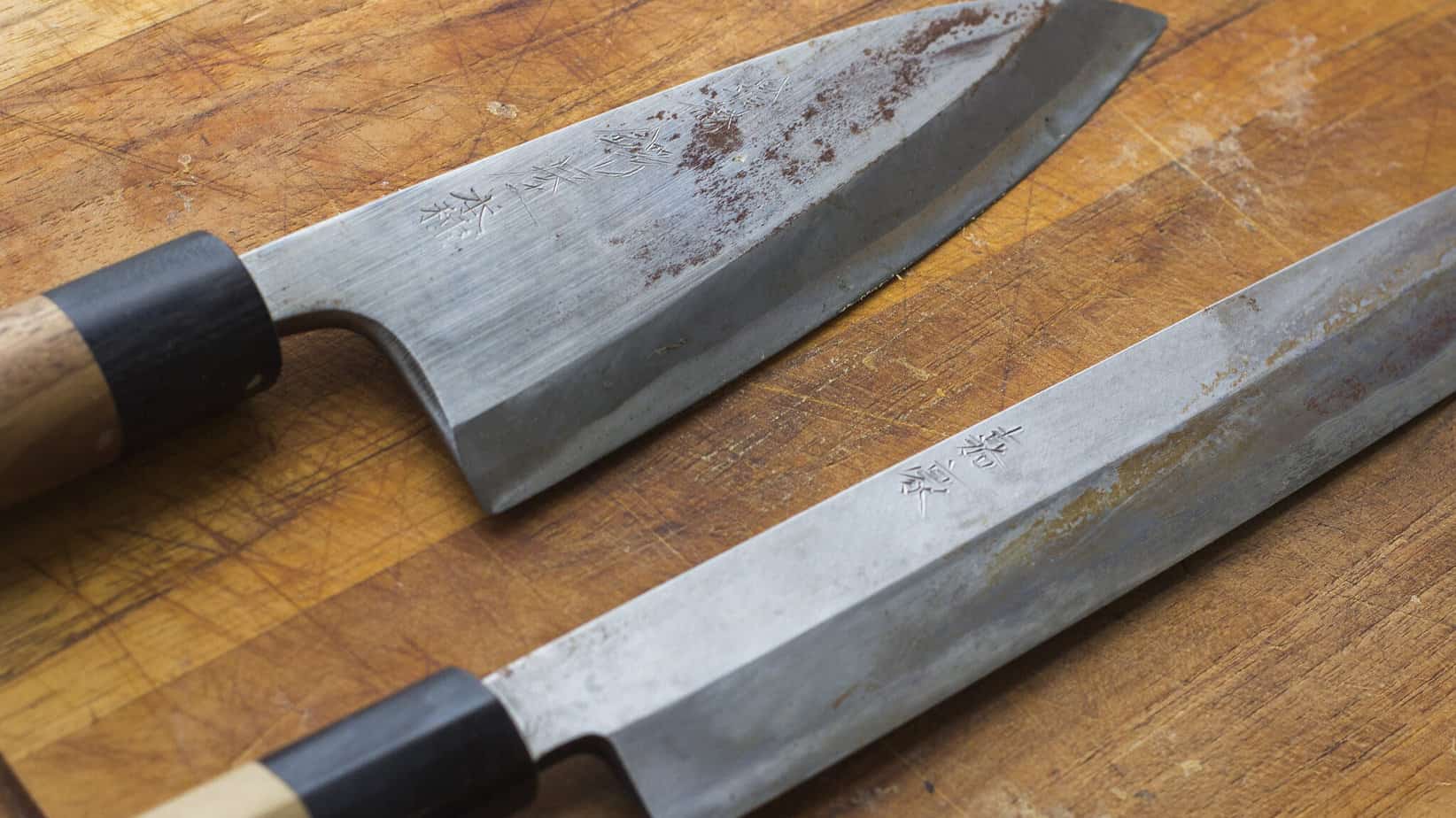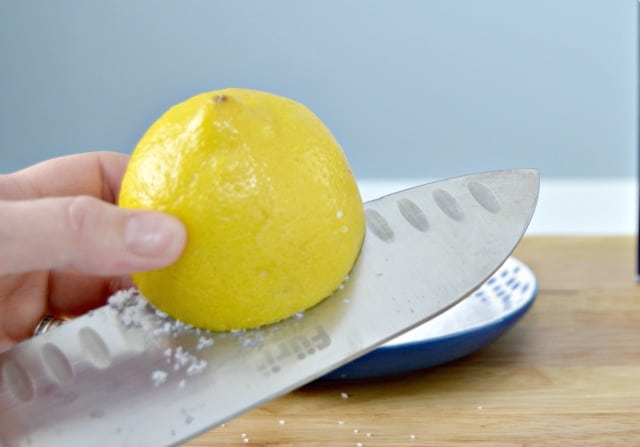How to Remove Rust from Kitchen Knives
| Mini guides to kitchen knives: Kinds of kitchen knives | Materials and construction | Storing | Sharpening | Maintaining sharpness | Rust removal | Disposal | Knife skills | Western or Japanese knives | Main kitchen knife guide |

Kitchen knives are essential tools for any home cook, but over time, they can get rusty which is not nice for several reasons.
Rust not only mars the appearance of your knives, but it also ruins the knife’s proper performance. It can also create health risks if it flakes off into your food.
Fortunately, removing rust from kitchen knives is a manageable task with the right techniques and tools. Here are the ways we recommend when dealing with how to remove rust from kitchen knives.
Why are my kitchen knives rusting?
There are several reasons why kitchen knives can rust and knowing and understanding these reasons will help you understand how to avoid getting rusty knives.

- Moisture is the most common reason for rust on knives. When knives are not immediately and properly dried after use, water can accumulate on the blade, leading to the formation of rust.
- Acidic foods such as tomatoes and citrus fruit might react with the metal of the blade and accelerate the rusting process.
- Bad cleaning will leave residue on the knife blade that can promote rusting. Always clean a knife immediately after using it and clean it properly to ensure all food partials are gone.
- Dishwashers are a no-go when it comes to cleaning knives as they not only make the blade of a knife dull more quickly, but the detergents and high water pressure can contribute to corrosion. The heat and humidity inside the dishwasher can also lead to moisture-related rusting.
- Storage conditions are another important factor. Never leave knives in a damp or humid environment as it can cause rust formation.
- Low-quality materials and poor craftsmanship may be a reason why knives rust. High-carbon stainless steel is commonly used for kitchen knives because it resists rusting better than some other materials.
One thing we should note is that if your knife is beyond repair and refurbishing, then you may have no choice, but to dispose of the kitchen knife in a safe manner.
4 ways to remove rust from kitchen knives with natural products
Never use abrasive materials or chemicals to remove rust, as these can damage the knife. Minimising the risk of rust formation is definitely a better approach than having to remove it.

1. Vinegar
- Fill a container with white vinegar and soak the rusted knife for a while. Depending on the amount of rust, soak for a few hours or overnight.
- Use a soft sponge or brush to remove the rust.
- Rinse and dry thoroughly.
2. Baking soda
- Mix baking soda with water until you get a thick paste.
- Carefully apply the paste with the help of a soft cloth to the rust spots on the knife.
- Leave the paste for a minimum of one hour.
- Use a soft sponge or a soft toothbrush to remove the rust.
- Rinse and dry thoroughly.
3. Lemon and salt
- Apply salt to the rust stains.
- Squeeze lemon juice onto the salted areas.
- Leave for a few hours.
- Carefully scrub the knife with the lemon rind, a soft brush or soft sponge.
- Rinse and dry thoroughly.
4. Potato
- Slice a potato in half.
- Dip the potato with the cut side on dish soap or baking soda.
- Rub the rusted areas of the knife with the potato.
- Rinse and dry thoroughly.
How to prevent rusting of knives
- Hand washing is the only correct way to clean a knife. Using mild dish soap with warm water will always do the trick.
- Drying the knife immediately after washing and ensuring it is completely dry before storing will keep your knife in good condition for a longer period of time.
- Cutting on the right surface and avoiding cutting on hard surfaces like glass or stone protects the knife blade. If you find that you have dulled your knife from not cutting properly, you need to know how to sharpen the knife to keep it in good working order.
- Oiling the knife blade means applying a thin layer of food-safe mineral oil or other appropriate knife oil to the blade which helps protect it from moisture.
- Storing knives properly and in a dry place is as important as cleaning them correctly.
How to get rust off a knife
A detailed guide for removing rust from knife
1. Safety First
- Wear Gloves: Protect your hands from sharp edges and any cleaning agents you might use.
- Work in a Ventilated Area: If using chemical rust removers, ensure good ventilation.
2. Assessing the Rust
- Surface Rust: Light rust can often be removed with household items.
- Deep Rust: Heavier rust may require stronger methods or professional help.
3. Materials Needed
- Mild dish soap
- Warm water
- Non-abrasive scrubbing pad or sponge
- White vinegar or lemon juice (for mild rust)
- Commercial rust remover (for severe cases)
- Aluminum foil (alternative method)
- Fine steel wool (for stubborn rust)
- Mineral oil or knife oil
4. Cleaning Process
For Light Rust:- Soap and Water: Start by washing the knife with dish soap and water to remove any dirt or grease.
- Vinegar or Lemon Juice Soak: Submerge the knife in white vinegar or lemon juice for about an hour. The acidity helps break down rust.
- Scrub Gently: Use a non-abrasive pad to scrub the rust off gently.
- Rinse and Dry: Thoroughly rinse the knife and dry it immediately to prevent further rusting.
- Commercial Rust Remover: Apply according to the instructions. These are typically stronger and more effective but can be harsh on the knife’s metal.
- Steel Wool: For really stubborn rust, gently scrub with fine steel wool. Be cautious as this can scratch the knife.
- Aluminum Foil Method: Use a piece of crumpled aluminum foil dipped in water or vinegar. The aluminum reacts with rust and can help remove it.
5. Prevention
- Oil the Knife: After cleaning, apply a thin layer of mineral oil or specialized knife oil to protect the blade.
- Proper Storage: Store knives in a dry place. Moisture is the primary cause of rust.
- Regular Maintenance: Regular cleaning and drying after each use can prevent rust.
6. Professional Help
If the rust is too deep or the knife is valuable or an antique, consider seeking professional help to avoid damaging the knife.
Caution- Avoid using harsh abrasives or steel wool on high-end knives as it can damage the finish.
- Be careful with chemical rust removers; follow all safety instructions.
Final note on how to remove rust from kitchen knives
Removing rust from kitchen knives is essential in keeping their functionality, appearance, and longevity.
By using the methods we discussed above, you can effectively restore knives to their prime condition.
Consistent maintenance, immediate drying after washing, and proper storage can further prevent rust formation in the future.